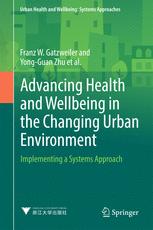

Most ebook files are in PDF format, so you can easily read them using various software such as Foxit Reader or directly on the Google Chrome browser.
Some ebook files are released by publishers in other formats such as .awz, .mobi, .epub, .fb2, etc. You may need to install specific software to read these formats on mobile/PC, such as Calibre.
Please read the tutorial at this link: https://ebookbell.com/faq
We offer FREE conversion to the popular formats you request; however, this may take some time. Therefore, right after payment, please email us, and we will try to provide the service as quickly as possible.
For some exceptional file formats or broken links (if any), please refrain from opening any disputes. Instead, email us first, and we will try to assist within a maximum of 6 hours.
EbookBell Team

5.0
90 reviewsThis book addresses up-to-date urban health issues from a systems perspective and provides an appealing integrated urban development strategy based on a 10-year global interdisciplinary research programme created by the International Council for Science (ICSU), and sponsored by the InterAcademy Partnership (IAP) and the United Nations University (UNU). The unique feature of this book is its “systems approach” to urban health and wellbeing: solution-oriented for science and society and not purely theoretical, it can be applied in the context of decision-making, and has the potential to unlock cities’ unused potential by promoting health and wellbeing. Furthermore, the inter- and transdisciplinary urban issues addressed in this book are examined from a cross-sectoral perspective – e.g. the transport sector is addressed in connection with air pollution, respiratory and cardiovascular diseases and the loss of productivity. The interconnected thinking to urban health and wellbeing makes the book a particularly valuable resource.
Decision makers in city administrations and civil society organizations from different geographical regions will find the book an informative and inspiring guide for delivering towards the goals of the New Urban Agenda, for which health can be the vital indicator of progress. Graduate students and researchers will be attracted by the case studies, systems methods and models provided in the book.